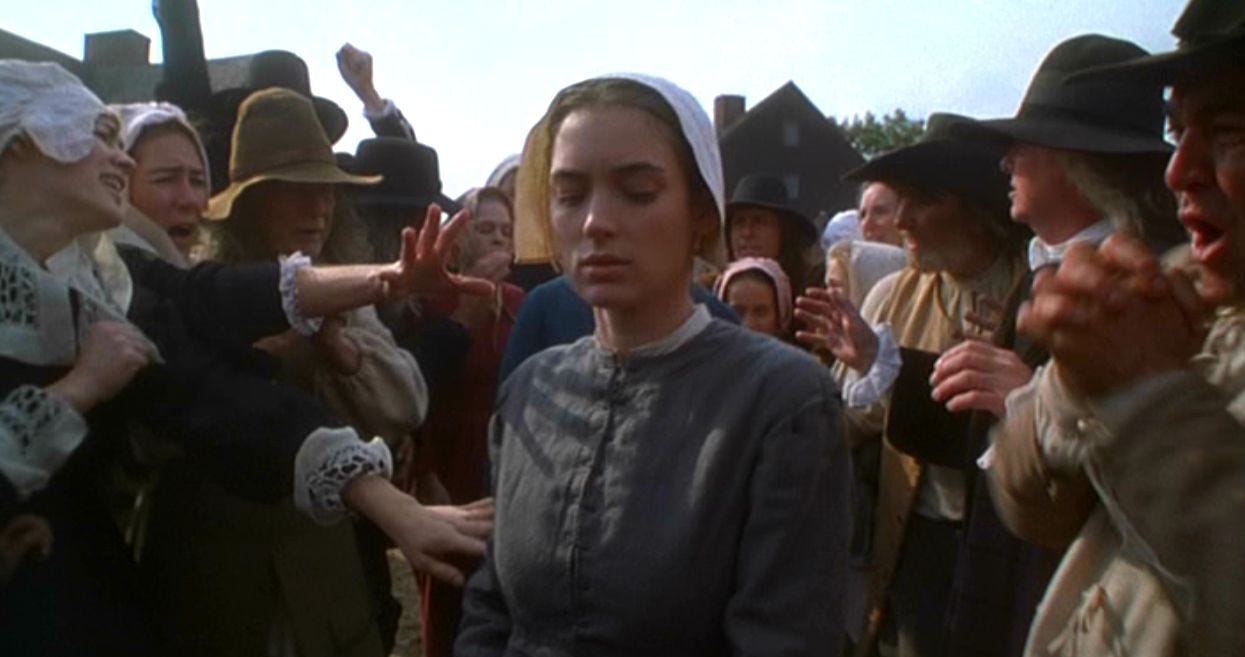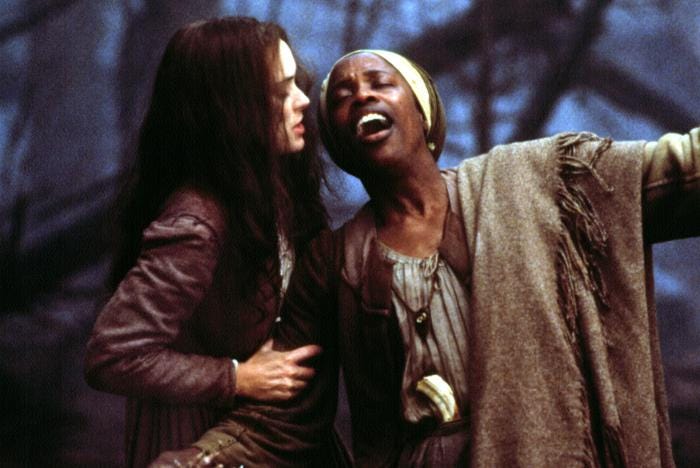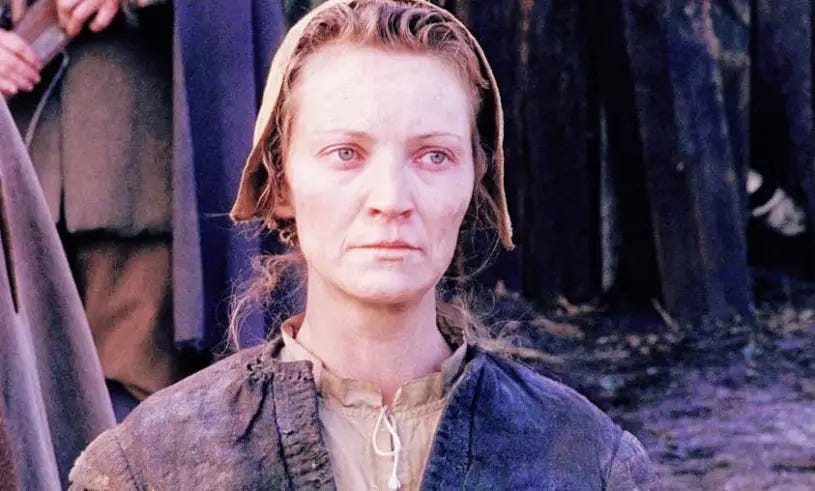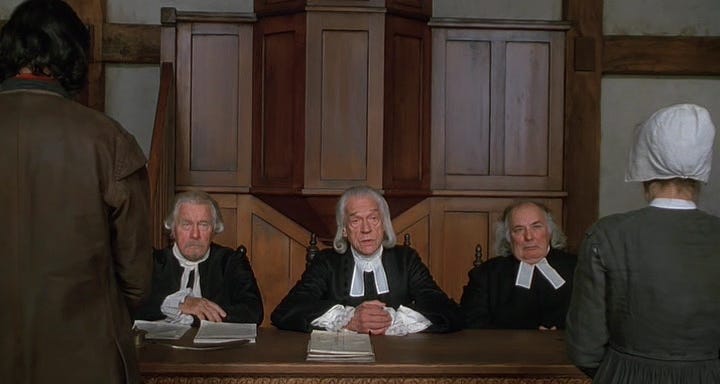The Witchvox Project #4: The Crucible
Nicholas Hytner's powerful film has a scorching screenplay by Arthur Miller
(The Witchvox Project is an ongoing series of posts to this blog, reprinting all of my reviews and media articles from The Witches’ Voice website from 1997 through around 2008. This is being done in tandem with research for my forthcoming book The Witching Hour: How Witches Enchanted the World.)
I was privileged to see an excellent stage production of The Crucible at Long Wharf theatre back in the late 1980s, starring Ann Dowd (The Handmaid’s Tale) as Abigail. It was a stirring and beautiful production. The play is produced at the amateur level so often that many people tend to forget how very powerful it can be, and what a timeless work of literature it is. The 1996 film version has lost none of its power, and is indeed every bit as relevant as a political allegory today as the stage play was in 1952.
***
As with a favorite novel, or a much-loved song, we grow to treasure certain works of art as our own. We craft physical traits for characters, imagining the texture of their complexions, the timbre of their voices, the rhythm of their footfall on the stairs. On the stage, these portrayals are created anew with every actor's interpretation. When these denizens of the page leap to the silver screen, however, we are often disappointed, especially when Hollywood gets involved. Captured in celluloid as a fly trapped in amber, often these cinematic representations of our favorite stories or myths become definitive ones. And this is an occurrence specific to one's generation; thus, many of us remember a wooden Kevin Costner as Robin Hood, not a dashing Errol Flynn, or a fiery Sean Connery.
And what about film narratives based upon actual historic events, where we have no photographic image to refer to? How do we all wish to imagine the residents of Salem Village, circa 1693? For even as The Crucible, published in 1953, remains an effective illumination of the McCarthy era, it is also a vivid imagining of the Matter of Salem, and playwright Arthur Miller's words gave voices and passions to these sad figures of American history. It took over forty years, including a period in which Miller himself was blackballed for "un-American activities, " to bring this play to the screen. Nicholas Hytner, who directed the award-winning The Madness of King George, has deftly interpreted this masterwork, in all its somberness, insanity and pathos. And a constellation of fine actors peoples this powerful chronicle of New England's darkest time, creating solid, resonant and, yes, definitive portrayals which will live in our collective consciousness, I predict, for many years.
For the film version, Miller has adapted his own stage play, adding powerful scenes which had previously only occurred "offstage." The film opens with 18-year old Abigail Williams (an incandescent performance by Winona Ryder) bolting awake in bed, grabbing the hand of young cousin Betty Parris, and the two race breathlessly through Salem Village to the moonlit woods. There, they dance beneath a full moon with a dozen other young women, all servants to village families, and with Tituba (Charlayne Woodard), a slave from Barbados. The Reverend Parris (Longtime Companion's Bruce Davison) discovers them, watching in horror as Abigail drinks chicken blood and several others shed their clothing. At his shout, the girls scatter; all but Betty, who suddenly cannot move, and Abigail, who stays with her.
No doubt Parris would want to keep these nocturnal antics of his daughter and niece a secret from the village; but the following morning Betty is unable to wake up. Witchcraft is suspected, and a Boston minister, Reverend Hale (Rob Campbell), is called to the village to investigate. By now several of the girls are ill or behaving strangely. Hale urges the girls to accept Jesus, and to stop summoning spirits with dancing in the woods; Abigail is the first to capitulate. The situation seems under control, until the girls, egged on by a vindictive villager, claim to have seen a number of their neighbors "with the Devil." In an instant, Salem is in insanity's grip, as a dozen citizens are accused of witchcraft. Some noted judges are called in, including Thomas Danforth (played with quiet menace by Paul Scofield), and the village is in an uproar as it prepares to see justice done.
On the outskirts of Salem Village lives level-headed, down-to-earth farmer John Proctor (Daniel Day-Lewis, intense and completely convincing). Viewed by his neighbors as a smart, sensible man, they are nevertheless shocked when he denounces the court proceedings as so much panic and foolishness. He knows Abigail is at the root of it, but his guilt over their brief affair keeps him from confronting her…until his own wife is accused.
With the accusation of pious Elizabeth Proctor (Joan Allen), it becomes clear that no one is above suspicion. And the accusers, young women whose servitude made them unlikely prospects for good marriages, are for the first time in their lives made the center of attention, as the role of "court official" is thrust upon them. The judges hang on their every word, and when their titillating theatrics prompt a few villagers to leave the proceedings in disgust, the dissenters, among them the kindly Rebecca Nurse, are also accused. The circus atmosphere is altogether too much for John Proctor, who finally demands that Abigail stop trying to win him back with her vicious games. But she is too caught up in her own obsession to admit she is only playacting; she stands by dispassionately as first Elizabeth and later Proctor himself are hauled off to jail. Reverend Hale, convinced of Proctor's innocence, quits the court in frustration.
But even Abigail could not predict the unthinkable; that Proctor would refuse to confess in order to save himself. For in Colonial Salem, an unconfessed witch was sentenced to hang, but, ironically, one who admitted trafficking with Satan would be pardoned. As the jails are filled to overflowing, and more and more of the accused refuse to confess, the judges become reluctant to administer "justice." Too late, they understand that they have been manipulated by the attention-seeking accusers; and that they themselves have sentenced innocents to die, in an orgy of politically-motivated, strong-arm scare tactics. (It is no secret that many New Englanders accused of witchcraft possessed land that their neighbors, by accusing them, sought to appropriate; in the case of widows who had inherited their husbands' acres, the statistics are truly shocking. Members of the judiciary shared in this "wealth" just as local merchants and clergy did.*) Where the township sought validation, the justices sought notoriety.
When Abigail foolishly tries to convince Danforth that Hale's wife came to her as a demon, he carefully informs her she is "mistaken." Abigail begins to sense that her days in Salem are numbered, and approaches Proctor one last time, the day he is meant to hang on the gallows.
Have no fear that Hollywood has cleansed the story, ending on a note more upbeat than Miller or history would have us expect. Spiraling toward its heartbreaking yet triumphant conclusion, the film enfolds us in a terrible cradle of understanding. Watching the perpetration of lies, betrayal and petty hatreds, modern audiences will nod with empathy; we are still subject to the tyranny of injustice, ignorance and blind faith. I was struck again and again with how the Salem townsfolk, whipped into submission by the court justices, reminded me of the American public, which today allows itself to be stripped of its dignity and autonomy by a corrupt government and an unreliable "news" media. Those of us who have deliberately rejected the spiritual status quo will find the Puritanical brand of intolerance particularly chilling.
As political allegory, The Crucible is heavy-handed; but it has always meant to be so. As a period piece, Hytner's film is impressive; costumes, settings, dialects, props, every last detail is scrupulously authentic. As entertainment, I cannot think of a more moving film I have seen this past year; the actors are, simply put, amazing. Winona Ryder displays a maturity and sexual energy I had not even thought her capable of; her Abigail is complex, vain yet vulnerable, crafty yet culpable. Daniel Day-Lewis (always astounding, if occasionally miscast) brings subtlety and inscrutability to Proctor, a character who, on the stage, often becomes merely melodramatic in his self-righteousness. And Joan Allen (a stunningly good actress) is near-perfect as Elizabeth, a woman struggling to retain her integrity.
What relevance is here for modern Witches? Believing as we do in reincarnation, we frequently meet those who know they were accused, or accuser, in a past life. Salem and the European witchcraze have an ugly significance for us, even as we are fascinated by the stories of hysteria and brutality. Whether the Salem twenty were practicing magic is not of importance; that they were unjustly, stupidly executed is. Whether the thousands slaughtered across Europe, across three centuries, were part of an underground fertility cult or an ancient tradition of goddess worship, is beside the point; that they were tortured by Church-appointed witch-finders is worth remembering. We would do well to understand that, as Nobel prize-winner Elie Wiesel said at the Salem Tercentennial, "there are still Salems."










